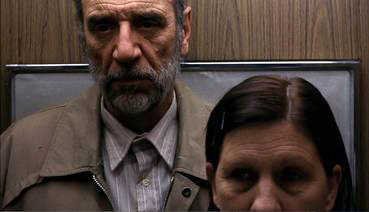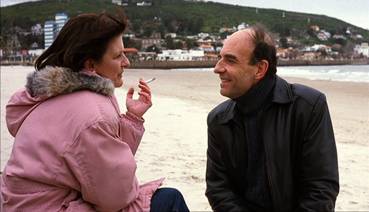|
It's
always refreshing to encounter a first film from a young director, or in this case
second feature from two young directors, that does not scream
of a childhood fed by MTV and the Hollywood product. It's especially pleasing when the film is as wonderfully restrained and
as cinematically assured as Juan Pablo Rebella and Pablo
Stoll's Whisky.
The
style is set in the opening shot, which if caught unprepared
could be mistaken for Abbas Kiarostami, a through-the-windscreen
view that does not reveal the driver and does not cut away
(opening credits aside) until the vehicle arrives at its
destination. And yet without aid of dialogue we are shown
a journey to work that starts early in the morning and covers considerable
distance, and even before we meet sock factory owner Jacobo
Köller, we know something about his life and daily
routine. Indeed, routine governs the otherwise empty lives
of both Jacobo and factory supervisor Marta, whose paths
cross only when Marta brings Jacobo his mid-morning coffee,
always interrupting a failed attempt to fix the blinds that
rob his office of natural light. Jacobo's mother has recently
passed away, and he is soon to be visited by his long lost
brother Herman, who has pursued a similar career to him
but in Brazil and with far greater success. Wanting to convince
Herman that he has made something of his life, Jacobo asks Marta
to pose as his wife for a few days, but the situation is
complicated when Herman suggests that all three take a short
holiday together.

It
is both inevitable and appropriate that Whisky
has been compared to the works of Aki Kaurismaki, an association
that does the film no harm at all. In particular the look,
pace and tone recall Kaurismaki's excellent 1990 The
Match Factory Girl [Tulitikkutehtaan tyttö],
with its focus on the unglamorous details of everyday life
and work and the unforced observational comedy that arises
from this – Jacobo's deadpan weariness at his car's
repeated refusal to start, his request that a café
light be switched on only to have the owner stand on a chair
and tap the loose fluorescents, the too-big wedding ring
that falls off Marta's hand the moment she lowers it, the
hilarious reveal of Jacobo's weary face as soapy water is
wiped from the windscreen of his car.
The
film excels in communicating a good deal of information with
the simplest of techniques, in particular through a superb
use of seemingly inconsequential cut-aways that provide
windows to verbally unmentioned back stories – two simple
shots, dropped in casually amidst others on Marta's arrival
at Jacobo's flat, tell us much about the departed mother's
final years and of Jacobo's own commitment to her, something
emphasised later by a similarly offhand image of him returning
an object to its former position after its earlier removal
by Marta.
Particularly
telling is the effect the arrival of Herman and the improvised
holiday has on the pair. For Jacobo it represents a reminder
of what he has failed to achieve, of a sibling rivalry that
once saw him always beat his brother at air hockey, but later
left him to take care of their mother while Herman left
home to find love and a family and success, things that
have continued to elude Jacobo. For Marta, however, Herman
brings an energy, hope and even joy to a life that has for
some time been devoid of all three. In keeping with the
film's style, directors Rabella and Stoll build on this
in the final third without ever being explicit – everything,
even the significance of the ending, is left for us to interpret, but the pointers are always clear.

Whisky is minimalist in the very best sense of the term, never
wasting a shot or a look or an edit, creating and engaging
us with sympathetic and interesting characters by focussing
on the ordinary rather than the extraordinary. The three
lead performances are all beautifully understated, and like
the Kaurismaki films to which it has been compared, the
film admirably demonstrates that unhappy characters can
still make for an involving, wryly amusing and even curiously
uplifting film. A nicely judged review on the IMDB carries
the headline: "You will miss these characters."
I already do.
For
those who do not know, the title refers not to the drink,
but to the word used in Uruguay to prod faces into a smile
for photographs, an action that twice has significance to
the film's narrative.
Much
of Whisky appears to have been shot using
source lighting or minimal practicals, resulting in scenes
that play in sometimes very low light levels, often a challenge
for DVD compression. The transfer here, however, is very
impressive, handsomely showcasing Bárbara Álvarez's
often splendid framed and tonally beautiful cinematography,
again echoing Timo Salminen's work on Kuarismaki's aforementioned The Match Factory Girl. Sharpness and colour
are very good – the contrast seems a little strong in places,
but this is how the film played in the cinema and feels
right for its tone and look. Blacks levels are rock solid
throughout. The picture is 1.85:1 and anamorphically enhanced.
The
DVD cover lists the soundtrack as being 5.1, but it is in
fact Dolby 2.0 stereo, but I seriously doubt a 5.1 track
would have made any difference to a film that uses its soundtrack
with the same economy and inventive minimalism as it does
its action. Clarity and range are fine, and the sound here
serves the film well.
The
Trailer (1:54) is non-anamorphic
1.85:1 and of a quality that is some way short of that of
the main feature. Some of the darker shots show just how
important a decent transfer is to the full appreciation
of the film, as characters are silhouetted and facial detail
is lost.
Making
of Whisky (27:03) is framed 4:3 and starts
with some behind-the-scenes DV footage of the opening of
the factory shutters, emphasising the importance of Bárbara
Álvarez's cinematography to the look and atmosphere
of even the most straightforward scene. In what is a rare
thing for me, I actually fast-forwarded through actress
Mirella Pascual explaining how she interpreted the character
of Marta – it's nothing against her, it's just that I by
then had a very specific view of the character in my own
mind and was just not ready to hear her deconstructed. But
it's there to go back to. There is some interesting audition
footage, especially as lead actors Andrés Pazos and
Jorge Bolani also auditioned for each other's roles, which
makes for an intriguing peek at how things might have been.
Script readings, rehearsals and film footage are intercut,
and the final five minutes are made up of rapidly edited
grabs from shot footage, including some cheery banter from
the young crew. The final "Whisky" improvised
crew portrait suggests a frindly and enjoyable shoot.
The
Deleted Scenes (10:24) are non-anamorphic
1.85:1 and consists largely of alternate takes of shots
included in the film.
The
Directors' Biography is brief
and to the point.
It
seems a rather nice coincidence that the very day after
we screened Whisky in the cinema the review
disc landed on my doormat, and it's particularly nice to
report that the film plays as well on DVD as it does on
the big screen. No film in which the characters are dour
for a large part of the running time is going to be an easy
sell, but Kaurismaki fans should find themselves well at
home here, and I would urge all but the hopelesly impatient
to give it a look. The presentation on Artificial Eye's
region 2 disk is first rate, and I choose my words deliberately
when I say it comes warmly recommended.
|